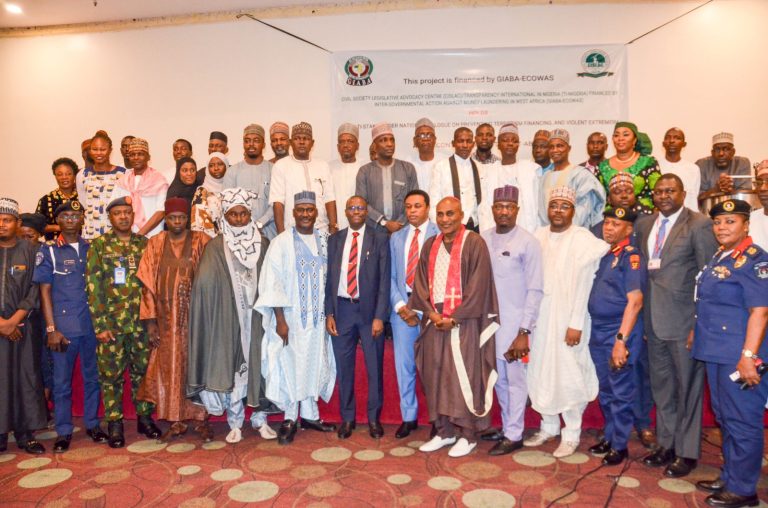The Civil Society Legislative Advocacy Centre (CISLAC) and Transparency International in Nigeria (TI-Nigeria) in a decisive call to action, have urged for a unified approach to combat terrorism financing.
This call was made at the Multi-Stakeholder National Dialogue on Preventing Terrorism Financing and Violent Extremism, held at the Abuja on Wednesday, giving to the recurring threats to lives and property of many Nigerians, occasioned by terrorism and violent extremism that have hitherto bedeviled the country.
“There is a critical need for coordinated efforts from both state and non-state actors to address the ongoing threats of terrorism and violent extremism, particularly in Nigeria’s North-East region, ” said Executive Director of CISLAC and Head of Transparency International in Nigeria (TI-Nigeria), Auwal Musa Rafsanjani.
Rafsanjani said terrorism constitutes a global threat, and Nigeria, unfortunately, is one of the countries that faces a high level of terrorism.
According to him, while attempts to combat terrorism and violent extremism in the country continue, policy attention has been shifted towards many sources of terrorism financing, which have continued to fuel terrorism and other violent conflicts in Nigeria.
“Without doubt, terrorism finance is the backbone of terrorist groups as funds go into buying weapons, recruiting militants, and operating terrorist organisations.
“The increasing concerns about the financing of terrorist activities within the country, have triggered unfavourable indices from the 2023 Global Terrorism Index (GTI), which ranks Nigeria eighth among the top ten countries with the greatest levels of terrorism in the world,” Rafsanjani said.
He added: “weak security and surveillance at national borders contribute to the issue of terrorism financing in Nigeria. This lack of control and monitoring allows terrorists, as well as small arms and light weapons, to infiltrate the country quickly.”
ALSO READ: Hajj 2024: Kebbi airlifts first batch of pilgrims
Rafsanjani stated that the former Chief of Defence Staff, Lucky Irabor, revealed that 137 out of about 261 borders in the North-East and North-West are unguarded.
According to him, with such easy access, terrorist organisations conduct operations and finance their activities more efficiently.
“This stresses the imperative of strengthening security measures at borders by Nigerian authorities to prevent the inflow of funds and resources for terrorist activities.
“Poor collaboration on the part of law enforcement and regulatory agencies has contributed to the problem of terrorist financing in Nigeria.
“Effective information sharing is crucial in combating terrorism financing, yet there seems to be a lack of coordination among various agencies and institutions.
“This hinders the ability to track and intercept suspicious transactions and apprehend those responsible for financing terrorism,” Rafsanjani stressed.
Also speaking at the dialogue , Director -General, GIABA, Edwin Harris, represented by Timothy Melaye, Country Head, GIABA said the institution has the mandated to coordinate the fight against money laundering and terrorism financing in West Africa.
“In response to the devastating effects of these crimes, the authorities of the Economic Community of West Africa (ECOWAS) established the Inter-Governmental Action Group against Money Laundering in West Africa (GIABA).
“In the year 2000 as a clear demonstration of their political will to address these challenges within the region and to support the global fight against these vices.
“Thus, the primary mandate of GIABA is to develop measures to protect the economies of member States from abuse and the laundering of the proceeds of crimes and to strengthen cooperation among its member States.
“Nigeria has immensely benefited from GIABA capacity building programmes, sometimes the gaps in our lifes is the gap of knowledge when we build capacity we close the gaps.
ALSO READ: Emefiele printed Naira notes without ‘strict approval’ – EFCC
“One key issue is the proliferation of small arms and light weapons because of money in wrong hands, we must all come together to support our security agencies,” he said.
Speaking on the efforts of the commission to stop the funding of terrorism, the Executive Chairman of the Economic and Financial Crimes Commission, EFCC, Ola Olukoyede, said the commission had focused on trailing funds.
“Part of the focus of the EFCC in the quest to tackle terrorism and violent extremism in that region is to follow the funds trail of critical actors in the region and cutting off the supply line of illicit funds to known criminal groups.
“This responsibility has seen the Commission pay more attention to the movement of funds by NPOs in the region, who are now required to make a declaration to the EFCC.
“Indeed the enactment of the Money Laundering( Prevention and Prohibition) Act, 2022 and the Terrorism ( Prevention and Prohibition ) Act, 2022 have strengthened the anti-money laundering and terrorism financing framework,” he said.
On his part, the Chairman, Independent Corrupt Practices and other Related Offences Commission, ICPC, Dr Musa Aliyu, said poverty and illiteracy had been identified as some of the main causes of terrorism in Nigeria.
“These twin ills must be tackled effectively to stop extremism and violent dissent. Bad Governance and corruption have a direct relation with the prevalence of poverty and illiteracy.
“The ICPC therefore has an active role to play in the prevention and elimination of these vices that create the conditions that allow extremism and terrorism to take root in the society.
“Our approach encompasses not only rigorous enforcement but also preventive measures aimed at fostering economic and social development,” he said.


